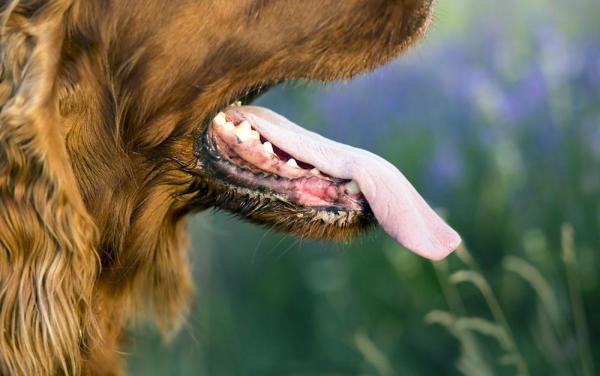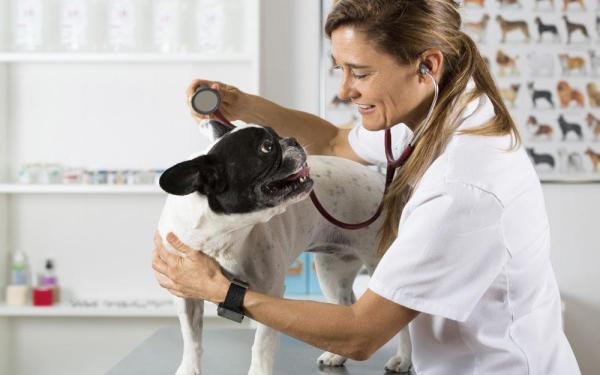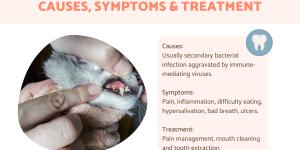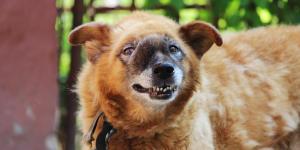Dog Breathing Difficulties - Causes And Treatment



See files for Dogs
Have you observed that your dog has been struggling to breathe? When faced with such a situation, it is essential to act quickly. When it comes to dogs and breathing difficulties, they are often related to pathologies that need to be diagnosed and treated as fast as possible.
Respiratory difficulties in dogs may be due to mild respiratory diseases, but can also reflect cardiac problems, specifically when it comes to older dogs. If your dog is finding it hard to breathe, keep reading this article on dog breathing difficulties for more.
Breathing difficulties in dogs
There are numerous causes which can explain why a dog has trouble breathing. Some of these causes are life threatening and cannot be ignored. A dog that is struggling to breathe could be experiencing serious health problems, such as: heat stroke or anaphylactic shock.
Take a look at these following signs in order to distinguish whether your dog is experiencing difficulty breathing:
- Rapid breathing: which should not be confused with habitual panting that dogs perform to lower its body temperature.
- Respiratory noises: such as, snorting, snoring, wheezing or stridor (high pitched weezing).
- Shallow breathing
A dog with severe shortness of breath that begins to go into shock will show signs of: wheezing, tachycardia and congested mucous membranes. A dog in advanced shock will present: mucous pallor, low body temperature, slow breathing rhythm, apathy, depression, a weak pulse or lack of pulse and/or unconsciousness.
In order to know how to react to a dog that is experiencing difficulty breathing, one must be aware of the breath itself. If your dog is breathing, even with slight difficulty, consult your veterinarian to determine the source of this problem.
If your dog cannot breath and begins to lose consciousness, in addition to immediately taking it to the veterinarian, you should act with artificial respiration or rescue maneuvers. If your dog has no heartbeat, perform immediate cardiopulmonary resuscitation (CPR) until you reach your veterinarian.

My dog is having trouble breathing and is shaking
If your dog is finding it hard to breathe and is having attacks similar to that of seizures; it might be suffering from dog poisoning. Dog poisoning requires immediate veterinary attention. If your dog is poisoned and not treated in the recommended amount of time, it could result in the death of the animal.
In order to avoid dog poisoning, keep your dog in a safe environment away from any toxins. In addition, we recommend positively training your dog not to ingest anything that has not be given to him/her, by you.
My dog is having trouble breathing through its nose
Diseases that cause nasal discharge, due to the greater or lesser obstruction of the nose, commonly affects a dog’s breathing. Sneezing in terms of nasal diseases is also common. Regularly related conditions include: Bordetella bronchiseptica, otherwise known as kennel cough. In addition to nasal secretion, you may notice your canine presenting symptoms of: ocular discharge, fever and anorexia.
As soon as you notice similar symptoms seek veterinarian assistance. If not, such nasal infections could spread to the lungs and result in a more severe case, such as pneumonia in dogs.
Canine distemper can also manifest, however, it is difficult to diagnose oneself as it carries the same symptoms as a cold. Therefore, if your dog has not been vaccinated accordingly, this needs to be taken into account. A dog suffering from rhinitis can also result in nasal discharge and breathing difficulties.
In addition to these above mentioned pathologies, one should take into account nasal stenosis in puppies of brachycephalic breeds, like bulldogs. Nasal stenosis causes respiratory obstructions in different degrees. It is characterized by snorting and snorting.This type of stenosis usually occurs at the same time as the elongation of the soft palate and the aversion of the laryngeal ventricles. This process constitutes so-called "brachycephalic dog syndrome".
Lastly, polyps and tumors in the nasal passages can also commonly interfere with a dog’s breathing.

My dog is choking
In this case, your dog may be experiencing difficulty breathing due to the presence of a foreign body, obstructing its larynx. This obstruction can cause a dog to cough choke, suffer from asphyxia and respiratory complications. This case requires immediate veterinary assistance and CPR, in the case that the dog has lost consciousness.
Objects such as rubber balls or bones are often responsible for dogs choking. Therefore, we recommend controlling and/or monitoring a dogs access to such objects.
A laryngeal edema may also occur in an anaphylactic reaction or as a result of heat stroke. This intubation complication can narrow or occlude the airways.
We also completely discourage the use of drowning collars, as they can severely damage a dog’s larynx.
My dog has trouble breathing and is vomiting
When it is difficult for your dog to breathe and they appear to have a runny nose, it is common that they will be nauseous, gag and/or vomit. This is due to a postnasal drip. In addition, the reflux of gastric contents in the lungs during vomiting can lead to the appearance of aspiration pneumonia, which can also occur alongside pathologies such as: megaesophagus or gastroesophageal reflux.
My dog has trouble breathing when sleeping
If it is difficult for your dog to breathe at night, it will usually be expressed in the form of a cough and/or rapid breathing. These dogs might also show intolerance to exercise, get tired more easily than normal and lose weight. Some might even carry an inflated abdomen. This symptomatology corresponds to dilated cardiomyopathy, a disease in which the chambers of the heart enlarge and the walls of the ventricles become thinner, causing the heart to fail.
All of these symptoms are reason enough for veterinary consultation, as the dog will require immediate and necessary treatment. Dilated cardiomyopathy and chronic valvular disease, with the involvement of the mitral valve, can produce congestive heart failure.
Dogs suffering from the above will experience labored breathing at rest.

This article is purely informative. AnimalWised does not have the authority to prescribe any veterinary treatment or create a diagnosis. We invite you to take your pet to the veterinarian if they are suffering from any condition or pain.
If you want to read similar articles to Dog Breathing Difficulties - Causes And Treatment, we recommend you visit our Other health problems category.







